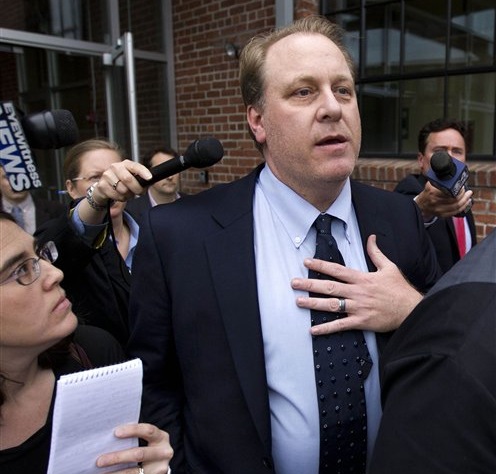WILMINGTON, Del. — A top executive for a failed video game company led by former Boston Red Sox pitcher Curt Schilling said Tuesday that the company tried up until the very last minute to work out a deal to stay afloat.
But William Thomas told a U.S. Bankruptcy Court trustee in Delaware that Rhode Island’s refusal to approve some $5 million in tax credit advances in May was the straw that broke the financial back of 38 Studios LLC.
Thomas, president and chief operating officer of 38 Studios, said private investors were willing to invest millions in the struggling company on condition that it get the tax credits, which the company planned to use to help meet payroll.
“There were several local investors, very high-net-worth people who had parameters around the deal,” he said, adding that one offered to invest $15 million in the company if it got the tax credits
“At 15-plus, they wanted to see the tax credits,” said former chief financial officer Richard Wester, adding that the tax credits and contingent private money probably would have allowed 38 Studios to file for a bankruptcy reorganization rather than a liquidation.
Providence-based 38 Studios was lured to Rhode Island from Massachusetts in April 2011 with a $75 million state loan guarantee two years ago.
The company filed for bankruptcy protection on June 7 after laying off workers in Rhode Island and Maryland and being more than two weeks late on a $1.1 million payment to Rhode Island in connection with the loan agreement.
Thomas said negotiations to try to keep the company afloat continued right up to the day of the bankruptcy filing, in which the biggest single liability listed is $115.9 million in debt obligation stemming from bonds backed by Rhode Island.
Thomas said that after moving to Rhode Island, 38 Studios met the job creation milestones contained in the loan agreement with the state, but nevertheless found itself running out of cash to fund its plan to self-publish a massively multiplayer online game, or MMOG.
“The deeper we got into it, we knew we needed to raise 30 to $50 million to finalize the MMO,” he said.
But Thomas said public discussion by certain government officials about 38 Studios’ solvency scared off potential investors and strategic partners in Asia and elsewhere.
“That became a serious weight around our neck,” he told bankruptcy trustee Jeffrey Burtch. ” … Nothing happened that we had anticipated from a fundraising perspective.”
Wester and Thomas refused to say how much Schilling had personally invested in the company because of uncertainty about whether the amount was confidential. An attorney for 38 Studios told Burtch that they would provide the information to him “offline” for the time being.
Tuesday’s meeting was a chance for the bankruptcy trustee and creditors to pose questions to representatives of 38 Studios about the company’s operations and finances, but there were more reporters than creditors in the room.
While much of the meeting was spent discussing details of 38 Studios’ organizational structure and accounting practices, Thomas also gave Burtch a tutorial in the workings of the video game industry. He noted that at the time of the bankruptcy filing, 38 Studios was nearing completion of a multiplayer online game code-named Copernicus.
Thomas and Wester said projected revenues for Copernicus, for which development was about 75 percent complete, exceeded $100 million a year.
Thomas noted that third-party industry officials upon whom he relied for feedback described Copernicus as a game-changer that was “better than anything out there.”
Copy the Story Link
Send questions/comments to the editors.



Success. Please wait for the page to reload. If the page does not reload within 5 seconds, please refresh the page.
Enter your email and password to access comments.
Hi, to comment on stories you must . This profile is in addition to your subscription and website login.
Already have a commenting profile? .
Invalid username/password.
Please check your email to confirm and complete your registration.
Only subscribers are eligible to post comments. Please subscribe or login first for digital access. Here’s why.
Use the form below to reset your password. When you've submitted your account email, we will send an email with a reset code.